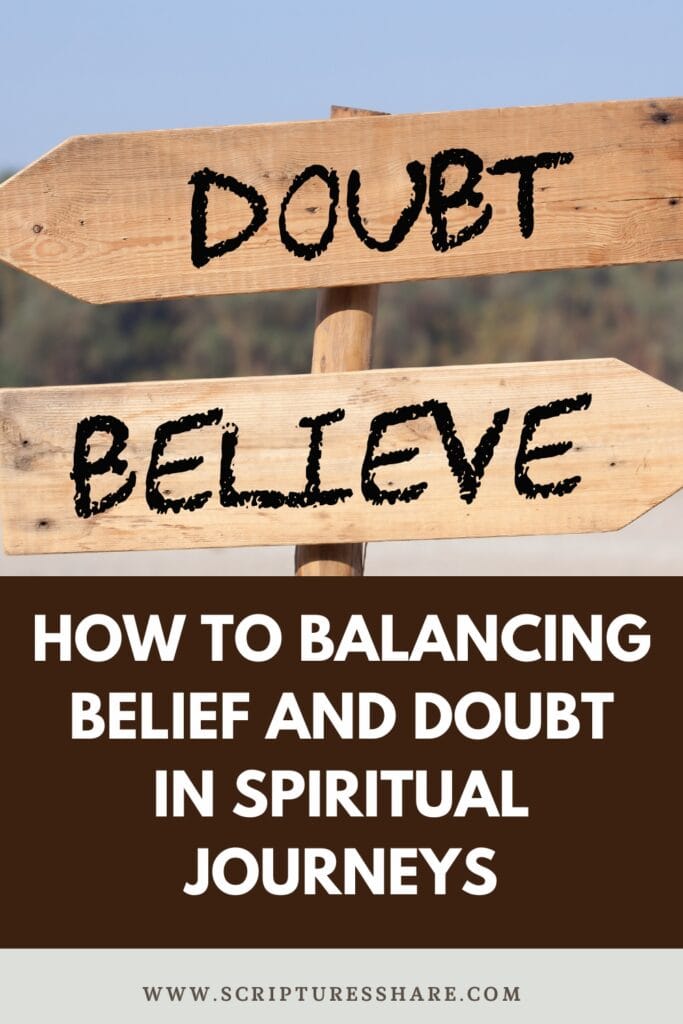No products in the cart.
Faithful Reflections: How To Balancing Belief and Doubt in Spiritual Journeys
This post contains paid and/or affiliate links. I make a small commission at no extra cost to you. Please see our Privacy Policy.
We often find ourselves caught between faith and doubt. These two seem like opposites but can actually help us grow. Faith gives us a solid base for our spiritual lives. Doubt, on the other hand, makes us question and seek deeper truths.
In our quest for personal growth, we see doubt as a key part of our belief systems. Doubt can pop up suddenly or stick around, making us question our beliefs. It shows how complex our spiritual paths can be.
Doubt is not something to be ashamed of. The Bible talks about doubt and shows how it can lead to a stronger faith. People who doubted found clarity and a closer bond with God.
Exploring faith and doubt takes us into the Bible’s teachings on doubt. We learn that doubt is a normal part of faith. It helps us grow spiritually. By facing doubt, we can grow personally and spiritually.
Let’s dive into the complex bond between faith and doubt in our spiritual journeys.
The Presence of Doubt in the Bible
The Bible is full of stories about doubt. Figures like Abraham, Sarah, and Thomas show us that doubt is common. They questioned their faith and God’s promises, showing us that doubt is a natural part of being human.
Doubting Characters in the Bible
- Abraham and Sarah doubted God’s promise of a son, laughing at the idea of having a child in their old age.
- Job questioned God’s justice during his suffering, wondering why he was going through so much.
- Moses doubted his ability to lead the Israelites out of Egypt, fearing he was not eloquent enough.
- Gideon questioned God’s call to lead an army against the Midianites, seeking signs and reassurances.
- Thomas refused to believe Jesus had risen unless he saw the wounds for himself.
These doubting characters show us that doubt is not a weakness. It’s a natural part of our humanity. Their doubts helped them grow closer to God.
Doubt can be tough, but it’s also a chance for growth. It makes us question our beliefs and seek answers. By facing doubt, we can deepen our faith and our relationship with the divine.
Doubt as a Natural Part of Faith
Doubt is not against faith; it’s a part of it. It doesn’t weaken faith; it can make it stronger.
At some point, we might doubt God, our beliefs, or the unseen parts of our faith. We shouldn’t fear or hide this doubt. Instead, we should welcome it as a natural part of our belief.
By questioning and seeking answers, we grow personally. Doubt pushes us to explore our faith’s roots. This leads to a deeper trust in God and the unseen world.
Belief Beyond Physical Evidence
True faith isn’t just about what we can see. It’s about conviction and trust in the unseen. Doubt makes us look beyond what’s visible.
While it’s tempting to rely on what we can see, faith asks us to believe in the unknown. Doubt helps us believe in the unseen, making our trust in God stronger.

Embracing Doubt for a Stronger Faith
We should welcome doubt as a chance for growth and change. Acknowledging and facing our doubts helps us understand our faith better.
Doubt makes us explore our beliefs more deeply. It helps us build a stronger, more real faith. As we deal with our doubts, we find answers to hard questions.
Trusting the Process
Trusting God when we doubt is hard but key to our spiritual journey. Doubt can make our faith stronger. Trusting God’s guidance leads us to peace and certainty.
As we face doubt and trust in God, we build trust beyond what we can see. This trust is the base of our faith, helping us stay strong even when things are uncertain.
Overcoming Doubt in Spiritual Journeys
Doubt is not bad for our faith; it can help us grow spiritually and mentally. Doubt makes us seek answers and rely on God when we’re unsure. It’s like getting vaccinated; doubt strengthens our faith by making us seek clarity.
We shouldn’t fear or hide doubt. Instead, we should use it to grow spiritually. By facing and exploring our doubts, we open up to transformative experiences and a deeper understanding of our beliefs.
Here are a few ways doubt can help us grow spiritually:
- Doubt makes us seek answers: When we doubt, we look for answers. This search can deepen our faith and connect us more with the divine.
- Doubt builds resilience: Overcoming doubts makes us stronger spiritually. We learn to trust God, even when we’re not sure, and find strength in our faith.
- Doubt promotes personal growth: Doubt makes us think critically about our beliefs and values. It encourages us to grow as we explore new ideas and insights.
- Doubt strengthens our faith: Doubt can transform our faith. By facing our doubts, we can deepen our belief in God and build a stronger spiritual foundation.
Instead of seeing doubt as a threat, we can see it as a chance for growth and spiritual growth. Embracing our doubts leads to self-discovery and deep transformation.
The Developmental Process of Doubt
Doubt is not static; it evolves over time. It starts simply, with clear right and wrongs. Then, as life gets more complex, doubt begins to question everything.
This questioning can be tough. It makes us feel unsure about our beliefs and the world around us. Doubt makes us think deeply about our faith.
This is a key time for belief systems to grow. Doubt makes us face our doubts head-on. We start to question and possibly change our beliefs.
But doubt doesn’t just stop at questioning. It leads to a deeper understanding. This is called harmony, where we see beyond our doubts and beliefs.
The Turning Point: Harmony
Harmony is when we’ve moved past doubt. We see life’s complexities more clearly. Our views expand, and we start to understand others better.
At this point, we feel a deep connection to everything. We see beauty and unity in all things. Our world becomes more connected and full of harmony.
The Transcendence of Doubts and Beliefs
Transcendence is when we see doubt as a chance to grow. It’s realizing that doubt and beliefs are connected. They’re two sides of the same coin.
When we transcend doubt, we become more open and compassionate. We’re ready to see things from different angles. This makes us stronger and more understanding.
- Stage 1: Initial simplicity – learning dualistic thinking
- Stage 2: Doubt – questioning beliefs and religious institutions
- Stage 3: Harmony – exploring empathy and diverse perspectives
- Stage 4: Transcendence – embracing doubts and beliefs for growth
In conclusion, doubt is a part of our growth. As we go through the stages of doubt, we learn and grow. Doubt helps us see the world in new ways and find harmony.
Transforming Religion through Doubt
Dualistic thinking and authoritarianism hold back growth in religion. They make it hard to question and grow. This thinking limits empathy and understanding.
But doubt can change and heal religion. By facing doubt and moving past binary thinking, we can change our religious practices. This leads to a healthier and more open faith.
Doubt is not weakness but a chance for change. It lets us question and explore new ideas. This is key to transforming our faith.
The Power of Dualistic Thinking in Religion
Dualistic thinking divides the world into simple opposites. This can make our belief systems rigid and close-minded. It stops us from seeing the world in a more nuanced way.
This thinking also supports the power of religious leaders. It makes it hard to question or challenge the status quo. This limits our spiritual growth.
Embracing Doubt and Questioning Authority
Embracing doubt means questioning those in power. It’s about looking closely at our beliefs and seeking a deeper faith. Doubt is a chance to grow and understand more.
Questioning authority is not about rejecting faith. It’s about seeking a true and meaningful spiritual journey. It’s about curiosity and a desire for authenticity.
Spiritual Transformation through Doubt
Spiritual transformation happens when doubt leads us to understand our beliefs better. It helps us let go of strict rules and embrace a kinder, more open way of seeing the world.
- Doubt makes us look at different views and talk to people with other beliefs.
- It helps us feel empathy and kindness as we see the variety of human experiences.
- Spiritual transformation through doubt helps us grow and feel closer to something greater.
By facing doubt and questioning old ways, we help our religions grow. This way, they can meet the needs of today’s diverse world.
Conclusion
Doubt is key to our spiritual and personal growth. It’s not something to fear but to welcome and learn from. Doubt helps us understand our spirituality and connect with something greater.
Doubt is for everyone, whether we follow a religion or not. It opens us to empathy, change, and harmony with the world.
Doubt sparks growth and challenges our beliefs. It makes us seek answers and deepen our spiritual connection. With an open mind and heart, we can navigate our journey of doubt and find a more fulfilling spiritual path.
FAQ
Is doubt detrimental to faith?
No, doubt is a natural part of faith and can lead to growth and a deeper understanding.
Are there examples of doubt in the Bible?
Yes, figures like Abraham, Sarah, Job, Moses, Gideon, and Thomas all faced doubt in their faith.
Is doubt the opposite of faith?
No, doubt is not the opposite of faith but a part of it. It helps us question and seek answers, making our faith stronger.
Can doubt be beneficial to spiritual growth?
Yes, doubt can be good as it makes us seek answers, trust in God, and deepen our faith.
What is the developmental process of doubt?
Doubt starts simply and grows to questioning and anger. It leads to a turning point where we explore empathy and find harmony.
How can doubt transform religion?
Doubt can change religions by encouraging us to question old beliefs and move beyond simple thinking.
How does doubt contribute to personal and spiritual growth?
Doubt is key to personal and spiritual growth, leading to empathy, change, and a deeper connection with the divine.











